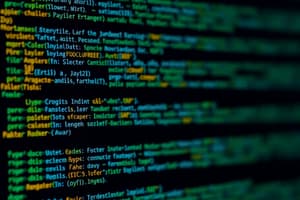Podcast
Questions and Answers
What is the primary purpose of functions in programming?
What is the primary purpose of functions in programming?
- To create an infinite loop
- To perform a specific task within a program (correct)
- To increase the length of the code
- To encapsulate global variables
Which of the following is NOT a benefit of using functions in modular programming?
Which of the following is NOT a benefit of using functions in modular programming?
- Faster program execution (correct)
- Easier facilitation of teamwork
- Better testing capabilities
- Code reuse
What character restrictions apply to function names?
What character restrictions apply to function names?
- Can contain anything
- Must not contain spaces and cannot start with a digit (correct)
- Can only use lowercase letters
- Must start with a space
What distinguishes a value-returning function from a void function?
What distinguishes a value-returning function from a void function?
What is the scope of a local variable?
What is the scope of a local variable?
Which statement about function headers is true?
Which statement about function headers is true?
What is a common convention for naming functions?
What is a common convention for naming functions?
Which of the following correctly describes modular programming?
Which of the following correctly describes modular programming?
What is the primary output of the function get_regular_price()?
What is the primary output of the function get_regular_price()?
Which statement correctly describes the function is_even()?
Which statement correctly describes the function is_even()?
What is the expected output when the input to the function is_even(3) is provided?
What is the expected output when the input to the function is_even(3) is provided?
What will the statement return first_name, last_name = get_full_name() provide?
What will the statement return first_name, last_name = get_full_name() provide?
What is a key benefit of using modules in Python?
What is a key benefit of using modules in Python?
Which of the following is a correct file name for a Python module?
Which of the following is a correct file name for a Python module?
What does a docstring provide for a function in Python?
What does a docstring provide for a function in Python?
Which of the following is NOT a requirement for creating a module in Python?
Which of the following is NOT a requirement for creating a module in Python?
What happens if you try to access a local variable before it has been created?
What happens if you try to access a local variable before it has been created?
Which of the following correctly describes the difference between an argument and a parameter?
Which of the following correctly describes the difference between an argument and a parameter?
What will the output be if you run the following code? 'print(x); func1(); print(x); func2(); print(x)' with x being a global variable.
What will the output be if you run the following code? 'print(x); func1(); print(x); func2(); print(x)' with x being a global variable.
What is the purpose of a value-returning function?
What is the purpose of a value-returning function?
How can you specify which parameter an argument should be passed to in Python?
How can you specify which parameter an argument should be passed to in Python?
What is an IPO chart used for?
What is an IPO chart used for?
Which statement is true about global constants?
Which statement is true about global constants?
What is the main advantage of using local variables inside functions?
What is the main advantage of using local variables inside functions?
What is the correct output when the following code is executed: 'print(x); func1(); print(x); func2(); print(x)' where x is a global variable?
What is the correct output when the following code is executed: 'print(x); func1(); print(x); func2(); print(x)' where x is a global variable?
Which statement is true regarding local variables?
Which statement is true regarding local variables?
How is a parameter defined in the context of a function?
How is a parameter defined in the context of a function?
What is the function of the 'return' statement in a value-returning function?
What is the function of the 'return' statement in a value-returning function?
What does the IPO in IPO Charts stand for?
What does the IPO in IPO Charts stand for?
Why is it recommended to create variables locally and pass them as arguments to functions?
Why is it recommended to create variables locally and pass them as arguments to functions?
What is true about a global constant?
What is true about a global constant?
What will happen if a local variable is accessed before it is created?
What will happen if a local variable is accessed before it is created?
Which of the following describes a benefit of using functions in a program?
Which of the following describes a benefit of using functions in a program?
What is required for defining a function's name in Python?
What is required for defining a function's name in Python?
In what way do void functions differ from value-returning functions?
In what way do void functions differ from value-returning functions?
What type of value does the function is_even(number) return?
What type of value does the function is_even(number) return?
What will be the output if the input number to the function is_even(4) is provided?
What will be the output if the input number to the function is_even(4) is provided?
Which of the following statements about function headers is accurate?
Which of the following statements about function headers is accurate?
Why is the divide and conquer approach beneficial in programming?
Why is the divide and conquer approach beneficial in programming?
Which of the following correctly describes the purpose of a docstring in a Python function?
Which of the following correctly describes the purpose of a docstring in a Python function?
What is the correct way to capture multiple return values from the get_full_name() function?
What is the correct way to capture multiple return values from the get_full_name() function?
What happens if you try to access a local variable outside its function?
What happens if you try to access a local variable outside its function?
Which of the following statements best describes the role of local variables?
Which of the following statements best describes the role of local variables?
What defines a module in Python?
What defines a module in Python?
Which of the following is a requirement for creating a Python module?
Which of the following is a requirement for creating a Python module?
What does the expression 'import' do in Python?
What does the expression 'import' do in Python?
What kind of input does the function get_regular_price() expect?
What kind of input does the function get_regular_price() expect?
Flashcards
Function
Function
A set of statements within a program designed to perform a specific task.
Divide and Conquer
Divide and Conquer
Breaking down a complex problem into smaller, manageable subproblems (functions).
Void Function
Void Function
A function that performs actions but does not return any value.
Value-Returning Function
Value-Returning Function
Signup and view all the flashcards
Function Name Rules
Function Name Rules
Signup and view all the flashcards
Local Variable
Local Variable
Signup and view all the flashcards
Function Header
Function Header
Signup and view all the flashcards
Function Scope
Function Scope
Signup and view all the flashcards
Function Argument
Function Argument
Signup and view all the flashcards
Function Parameter
Function Parameter
Signup and view all the flashcards
Global Constant
Global Constant
Signup and view all the flashcards
IPO Chart
IPO Chart
Signup and view all the flashcards
Parameter Scope
Parameter Scope
Signup and view all the flashcards
Function Return Value
Function Return Value
Signup and view all the flashcards
String Return
String Return
Signup and view all the flashcards
Boolean Return
Boolean Return
Signup and view all the flashcards
Multiple Values Return
Multiple Values Return
Signup and view all the flashcards
Module
Module
Signup and view all the flashcards
Modularization
Modularization
Signup and view all the flashcards
Docstrings
Docstrings
Signup and view all the flashcards
What is a function?
What is a function?
Signup and view all the flashcards
Why modularize with functions?
Why modularize with functions?
Signup and view all the flashcards
Function call
Function call
Signup and view all the flashcards
Local Variable Access
Local Variable Access
Signup and view all the flashcards
Import Statement
Import Statement
Signup and view all the flashcards
Input, Processing, Output (IPO)
Input, Processing, Output (IPO)
Signup and view all the flashcards
Return Value
Return Value
Signup and view all the flashcards
Boolean Functions
Boolean Functions
Signup and view all the flashcards
Multiple Return Values
Multiple Return Values
Signup and view all the flashcards
Study Notes
Functions
- A function is a group of statements within a program designed to perform a specific task.
- It's more efficient to break down large programs into smaller, manageable functions.
- This approach, known as the "divide and conquer" method, makes code more readable and easier to maintain.
- Modularized programs structure each task as a separate function.
Benefits of Modularizing Programs
- Simple Code: Small functions are easier to understand than long, complex code blocks.
- Code Reusability: Define a function once and use it repeatedly.
- Improved Testing: Each function can be tested independently.
- Faster Development: Functions can be developed for common tasks and re-used in other parts of the program.
- Teamwork Facilitation: Different programmers can work on separate functions concurrently.
Void Functions and Value-Returning Functions
- Void Functions: Perform certain actions, but do not return a value back to the calling part of the program.
- Value-Returning Functions: Perform actions and return a value to the calling part of the program.
Function Names
- Function names follow the same rules as variable names (e.g., no spaces, start with a letter or underscore).
- Use descriptive verbs emphasizing the function’s action.
- Examples:
calculate_area,display_message,get_input. - Capitalization and lowercase letters are considered distinct.
Function Definitions (Python)
- General format:
def function_name():
statement
statement
Local Variables
- Created inside a function and cannot be accessed outside the function.
- A local variable’s scope is the function in which it's created.
- Can only be used after it's created; using a local variable before its creation will generate an error.
Passing Arguments
- Arguments are data values passed into a function when it's called.
- Parameters are variables that accept arguments within a function.
- Python allows you to pass multiple arguments (data), and specify which parameter the argument should be assigned to, if necessary.
Global Variables
- A variable accessible to all functions within a program file.
- Modifying a global variable inside a function will only affect that variable's value locally.
- Modifying a global variable within a function can be achieved by using the 'global' keyword
Value-Returning Functions
- A function that returns a value back to the program.
- Python provides pre-built functions, which need to be imported (e.g., using the
importkeyword) to be used.
Returning Multiple Values
- Functions can return multiple values separated by commas.
Modules
- A module is a Python file containing code.
- It helps make large programs more manageable through modularization (splitting into smaller modules).
- Filenames should typically end with
.py. - Cannot be a Python reserved word (e.g.,
for). - Modules are imported using the
importkeyword.
Docstrings
- Docstrings provide clear descriptions of a function's purpose and how it works.
- They aid in documentation and understanding code.
- Docstrings are enclosed in triple quotes (
"""Docstring here""") and placed at the beginning of a function, module, or class. - They are used to generate documentation and explain what the code is designed to do.
Studying That Suits You
Use AI to generate personalized quizzes and flashcards to suit your learning preferences.




